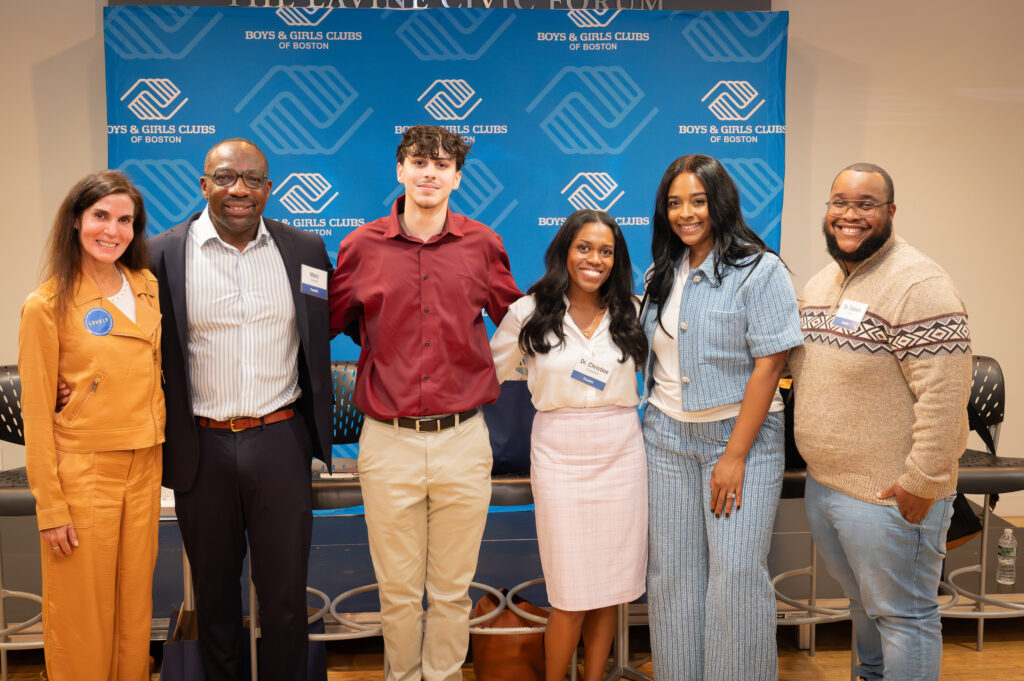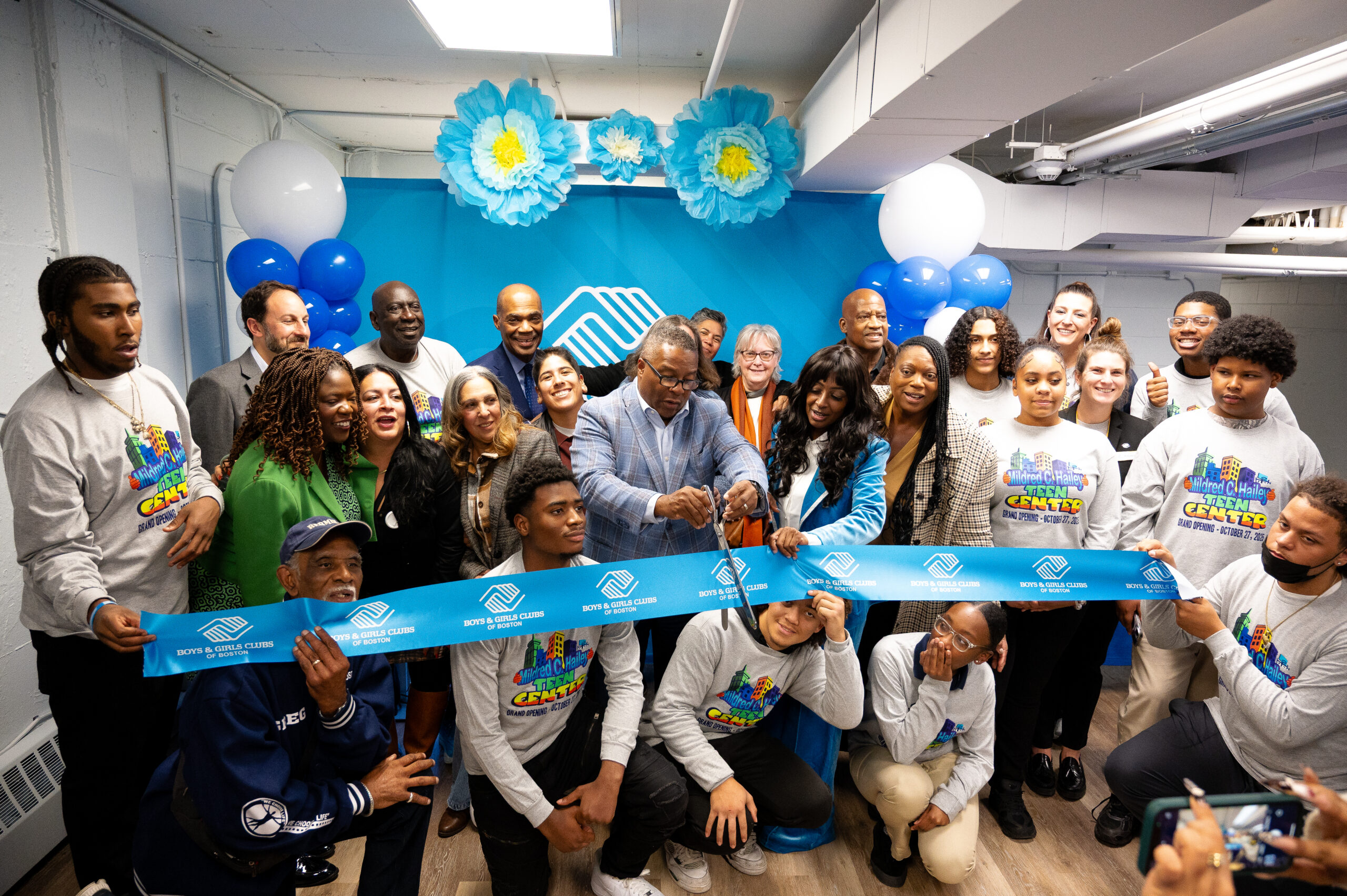At a time where youth loneliness is reaching an all-time high, meaningful connection with young people has never been more crucial. Dr. Christine Crawford, a Boys & Girls Clubs of Boston Trustee, Associate Medical Director for the National Alliance on Mental Illness (NAMI), and Assistant Professor of Psychiatry at Boston University Chobanian & Avedisian School of Medicine, recently authored “You Are Not Alone for Parents and Caregivers: The NAMI Guide to Navigating Your Child’s Mental Health.”
As we work together to address the on-going youth mental health crisis, Dr. Crawford shares six key evidence-based strategies that parents, guardians, and caring adults can use to protect the mental well-being of young people.
1. Create Safe Spaces for Open Conversations
Dr. Crawford emphasizes the importance of open dialogue when it comes to mental health. “Kids need to feel they can talk about their feelings without fear of judgment,” she says. Safe spaces, like those created at the Boys & Girls Clubs, allow youth to express their thoughts and emotions freely. Whether at home, school, or Clubs, creating environments where young people feel supported and understood encourages them to talk openly about their mental health and reduces the stigma around these discussions.
Set aside regular time each week to check in with your child, whether during dinner, a car ride, or before bed. Encourage them to talk about their day and listen actively without judgment.
2. Meet Them Where They Are (Yes, Even on Social Media)
Rather than fighting against social media use, use it as a connection point. With many teens using platforms like TikTok as their primary search engine, Dr. Crawford suggests sitting down and scrolling together. Instead of telling your kid to delete TikTok,” she advises, “be curious about which social media platforms they prefer.” Ask them to show you their favorite content creators and notice what’s trending on their “For You” page. This opens doors to deeper conversations about what interests them and insight into what might be concerning them.
This shared scrolling can reveal important insights about your teen’s interests and concerns. Pay attention to recurring themes in their feed – if you notice multiple posts about anxiety, for example, it opens the door to gentle conversations: “I notice there’s a lot of content about anxiety – is that something you’ve been thinking about?”
3. Encourage Positive Role Models
When young people see adults and mentors around them handling stress in healthy ways, they’re more likely to develop strong coping strategies themselves. Dr. Crawford highlights the role of mentors in mental health, such as those at the Josh Kraft Mattapan Teen Center, where staff and visiting professionals demonstrate effective stress management. Role models who are transparent about their own challenges and model healthy habits can inspire youth to do the same.
Research shows that young people benefit from having multiple trusted adults in their lives. Encourage relationships with extended family members who can offer different perspectives and support. Nurture connections with teachers, Club leaders and coaches who can mentor and guide them.
4. Foster In-Person Connections
Isolation and loneliness can severely impact mental health. Dr. Crawford stresses the importance of connection, pointing out that belonging to a community can act as a buffer against stress and anxiety. BGCB Clubs foster a close-knit environment where youth feel seen, valued, and part of something greater, which can greatly enhance mental well-being.
“We’re seeing a pandemic of loneliness,” Crawford explains. While technology plays an important role in youth culture, she emphasizes that face-to-face interaction remains crucial for healthy development.
Encourage young people to join groups that interest them, such as sports teams, clubs, or volunteer organizations. These connections help them build meaningful relationships, a critical component of mental health

5. Notice and Name What You See
Instead of generic questions like “How was your day?,” try observing specific changes or patterns. “Simply noticing and commenting on changes shows young people they matter,” says Dr. Crawford. Whether it’s a change in their appearance, energy level, or social patterns, approach with genuine curiosity rather than judgment.
Dr. Crawford emphasizes that many young people suffer quietly, with subtle changes often going unnoticed amid busy family schedules. The key is to voice your observations in a way that opens dialogue rather than forces it. Instead of saying “You seem depressed” or jumping to conclusions, try: “I’ve noticed you’ve been quieter lately – would you like to talk about what’s on your mind?” This approach shows both that you’re paying attention and that you’re creating a safe space for them to share when they’re ready.
6. Focus on Presence Over Perfection
Dr. Crawford emphasizes that parents often overcomplicate their approach to supporting their children’s mental health. “All your kids want is for you to just be there,” she notes. The most powerful tool parents have is their presence—expressing love regularly, acknowledging achievements, and simply being available. These straightforward actions have far more impact than elaborate parenting strategies or rigid rules. Take time to point out specific things you admire about them. Spend unstructured time together without an agenda. Express genuine interest in their world by asking questions and truly listening to their answers.
Remember: The Goal is Connection, Not Perfection
Dr. Crawford emphasizes that supporting young people’s mental health doesn’t require specialized training or complex strategies. “Simply being present and engaged with your kid, telling them how much you love them, talking to your kid about how much you notice them – all of those things are so important.”
In an age where one in five adults struggles with mental health challenges, it’s crucial to remember that perfect parenting isn’t the goal – consistent connection is. By implementing these strategies, you can help combat the rising tide of youth loneliness and create stronger bonds with the young people in your life.
Curious to learn more about BGCB? Learn more and get involved today.








